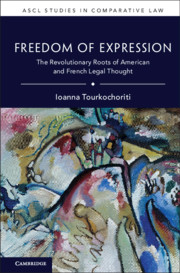Book contents
- Freedom of Expression
- ASCL Studies in Comparative Law
- Freedom of Expression
- Copyright page
- Contents
- Acknowledgments
- 1 Introduction
- 2 Antiquity, Modernity, and Historical Imaginaries on the Role of the Government
- 3 The Underlying Ex Ante Understanding of Liberty
- 4 The Moralizing Rational Republic versus the State Arbitrator of the Free Play of Interests
- 5 Foundation of the Rights of Man on the Rights of the Citizen versus Foundation of the Rights of the Citizen on the Rights of Man
- 6 Conclusion
- Bibliography
- Index
6 - Conclusion
Published online by Cambridge University Press: 29 October 2021
- Freedom of Expression
- ASCL Studies in Comparative Law
- Freedom of Expression
- Copyright page
- Contents
- Acknowledgments
- 1 Introduction
- 2 Antiquity, Modernity, and Historical Imaginaries on the Role of the Government
- 3 The Underlying Ex Ante Understanding of Liberty
- 4 The Moralizing Rational Republic versus the State Arbitrator of the Free Play of Interests
- 5 Foundation of the Rights of Man on the Rights of the Citizen versus Foundation of the Rights of the Citizen on the Rights of Man
- 6 Conclusion
- Bibliography
- Index
Summary
The conclusion evaluates the tendency to overdetermine the content of freedom of expression in France versus the tendency to underdetermine the content of the same liberty in the United States. It engages in a reflection on whether principles and rules elaborated in the past to meet concrete sociopolitical needs are still relevant to address contemporary concerns in the understanding of the limits of rights. It includes reflections on how variety in the protection of freedom of speech can be instructive in view of finding criteria that balance between expressive freedoms and other values when they are in conflict. The United States may be overprotecting freedom of speech in some respects and France may be underprotecting the same freedom. The chapter engages with contemporary debates on expressive freedoms and proposes criteria for government intervention to limit expression (or not) in each one of these cases. It proposes criteria to decide when the reason of the citizen is to be trusted over the reason of the state and the other way around.
Information
- Type
- Chapter
- Information
- Freedom of ExpressionThe Revolutionary Roots of American and French Legal Thought, pp. 231 - 249Publisher: Cambridge University PressPrint publication year: 2021
